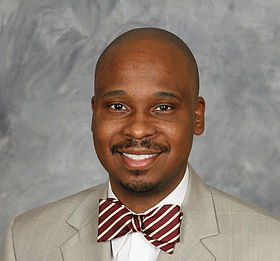 Twenty well-meaning, diverse nonprofit folks sitting in a classroom. “What words does our society use to describe young black males?” Dr. Bryant T. Marks, Sr. asks us. We pull out our phones and text a word to him.
Twenty well-meaning, diverse nonprofit folks sitting in a classroom. “What words does our society use to describe young black males?” Dr. Bryant T. Marks, Sr. asks us. We pull out our phones and text a word to him.
He clicks a key on his laptop, and a slide appears on the big screen at the front of the room. Our words pop up one by one to form a cloud. “Dangerous” and “criminal” loom huge, because so many of us texted them. The others vary in size but the theme is clear. Thug. Basketball. Dropout. Rap. Drugs. Gangs.
Even if we don’t think we actually believe these things, we know them. They are in our heads. Each of us knows exactly what words the dominant culture in the U.S. associates with being young, black, and male.
“Imagine if that was your brand,” says Dr. Marks. What he doesn’t say, but we hear anyway: he is a black man, so that is his brand in our society. “Sit with that for a minute.” He lets the silence stretch on. And on.
After awhile, he says, “Imagine what it takes to carry that around with you all the time. If you’re a young black man, there is no next slide. It’s always there.”
Finally we do move on. In our case, there are a lot more slides; this is a day-long training for our whole team on “The Hidden Biases of Good People: Implications for Nonprofits.”
Here are a couple more of my key takeaways:
- “If you live in a society and you have a brain, you have implicit bias. Humans are wired to treat in-group members better than out-group members. Bias is inevitable. And you’re still a good person.”
- Stereotypes are what our brains develop as shortcuts to think about a group based on what we’ve been exposed to about them; prejudice is how we feel about that stereotype (like or dislike); discrimination is negative or positive behavior towards them based on that like or dislike. That’s how our implicit biases work, without us even needing to notice consciously.
- To interrupt that, empathy is key. “You can only choose from the choices the situation offers you. Who or what controls the situation you’re choosing from, that’s the question. You can make a personal choice of what movie to see at the multiplex, but you can only choose what’s available… Empathy means, you don’t have to agree you’d make the same choice as someone else, but can you understand how their situation would affect them?”
Whether you agree with this or disagree, I can guarantee you one thing: Dr. Marks said it better than I just did. He travels all over the country educating police departments, elected officials, teachers and so on. I hope you get a chance to hear directly from him. Hope I can learn from him again another time too.